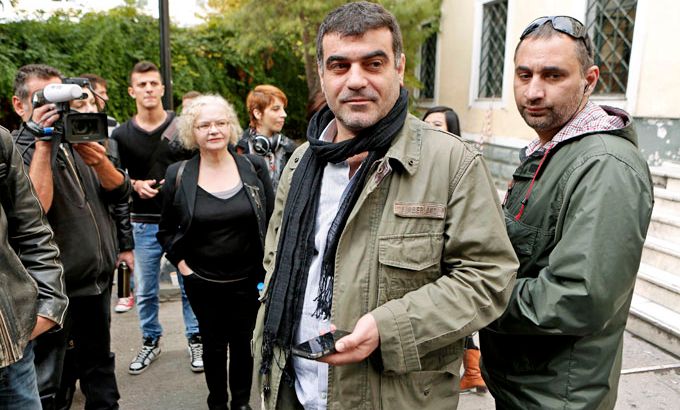Greek editor acquitted over Swiss bank list
Costas Vaxevanis “innocent” after he was tried for publishing list showing 2,000 Greeks with Swiss bank accounts.

A Greek journalist who published the names of more than 2,000 Greeks with Swiss bank accounts has been acquitted of breaking data privacy laws.
Costas Vaxevanis’s acquittal on Thursday came hours after he went on trial in a case analysts said was a test for press freedom in Greece.
“The court has ruled that you are innocent,” Judge Malia Volika said.
Speaking to Al Jazeera correspondent John Psaropolous after the acquittal, Vaxevanis said: “I want to thank Al Jazeera and the international media who put the story in its real context, saying that this is a question of democracy and freedom of speech in Greece, and created the conditions for coverage in Greece – the Greek networks knew nothing and found out what was going on from the international media, just like in the time of the colonels’ dictatorship.”
The arrest and speedy trial of Vaxevanis, a magazine editor, had aroused international concern and riveted recession-weary Greeks angry at the privileges of the elite.
In his defence, Vaxevanis, 46, accused politicians of hiding the truth and protecting an “untouchable” wealthy elite. He said the trial was politically motivated, calling it “targeted and vengeful”.
Vaxevanis published the list, called the ‘Lagarde list’, in Hot Doc magazine which he edits. The list took its name after IMF chief Christine Lagarde who handed it to her Greek counterpart two years ago when she was France’s finance minister.
“The Lagarde list” was then believed lost for two years, but resurfaced in early October, when Greek media printed stories regarding other lists containing names of politicians allegedly probed for their financial transactions.
The list Vaxevanis published contains names of heavyweight former ministers and businessmen, including Leonidas Tzanis, former Greek deputy interior minister, who committed suicide in the beginning of October.
It claimed the people named on the list made major deposits in Swiss banks, inferring that many avoided paying tax in Greece, a nation embroiled in a debt crisis since 2009.
During Thursday’s court proceedings, the court deposed four witnesses, including an opposition member of parliament who sits on the institutions and transparency committee, which has been investigating the affair.
Tax-dodgers
Two former finance ministers and former heads of the police’s financial crimes squad have appeared before that committee, but all said that they no longer possessed copies of the list.
Vaxevanis argued that authorities should instead target tax-dodgers and state officials who do not crack down on tax evasion.
“We will endure this. Will they?” Vaxevanis tweeted ahead of the trial.
His lawyer, Haris Ikonomopoulous, told Al Jazeera that the trial had put the Greek democracy at stake.
“What is at stake today … is transparency, accountability and effectiveness. What is at stake at the end of the day is democracy,” he said on Thursday.
In an article in The Guardian newspaper earlier this week, Vaxevanis wrote: “In Ancient Greek mythology, justice is presented as blind. In modern Greece, it is merely winking and nodding… justice remains in thrall to
politics.
“Dealings with banks are carried out in public, not in secrecy. The existence of a bank account is therefore not personal data.”
The allegations of tax evasion against the wealthy as well as the inability of authorities to tackle the phenomenon have increased tension in recession-hit Greece, as the government plans to pass new harsh austerity and reform measures on the already burdened middle class and low-income earners.
Greece has pledged to implement a tough stability and reform programme in return for vital multi-billion euro bailout loans since 2010, so as to keep the country afloat and avert a disorderly default.
Without further aid from the European Union and the International Monetary Fund, the country could financially collapse as early as December, some experts have said.